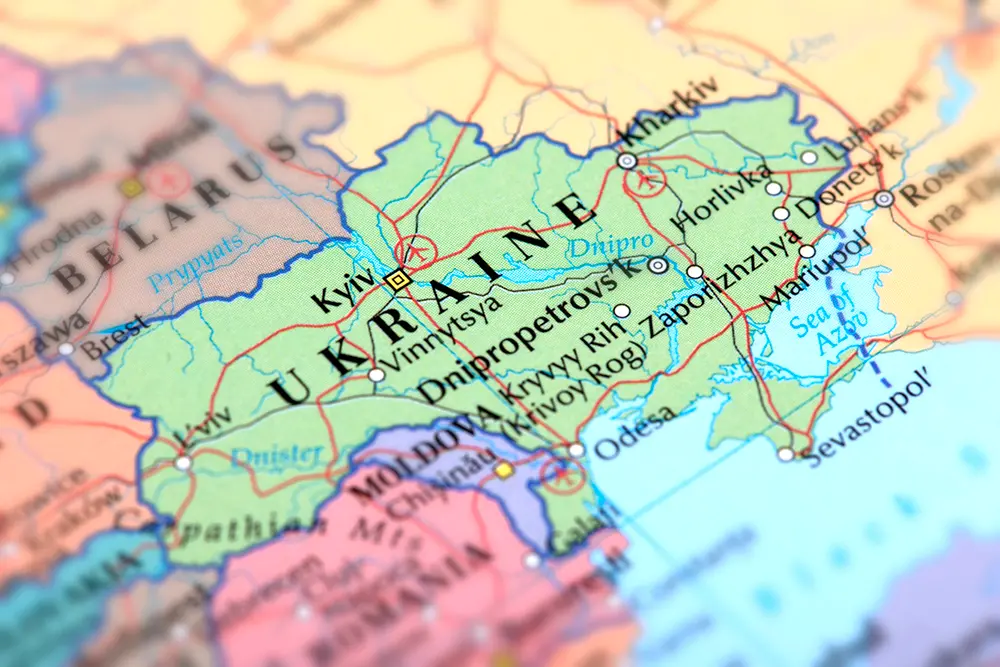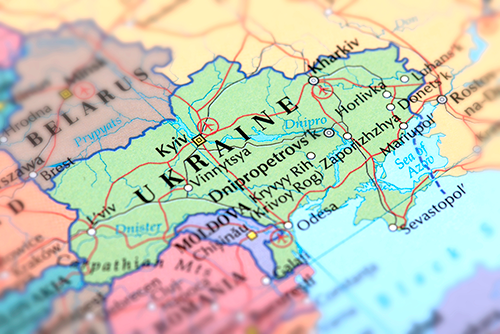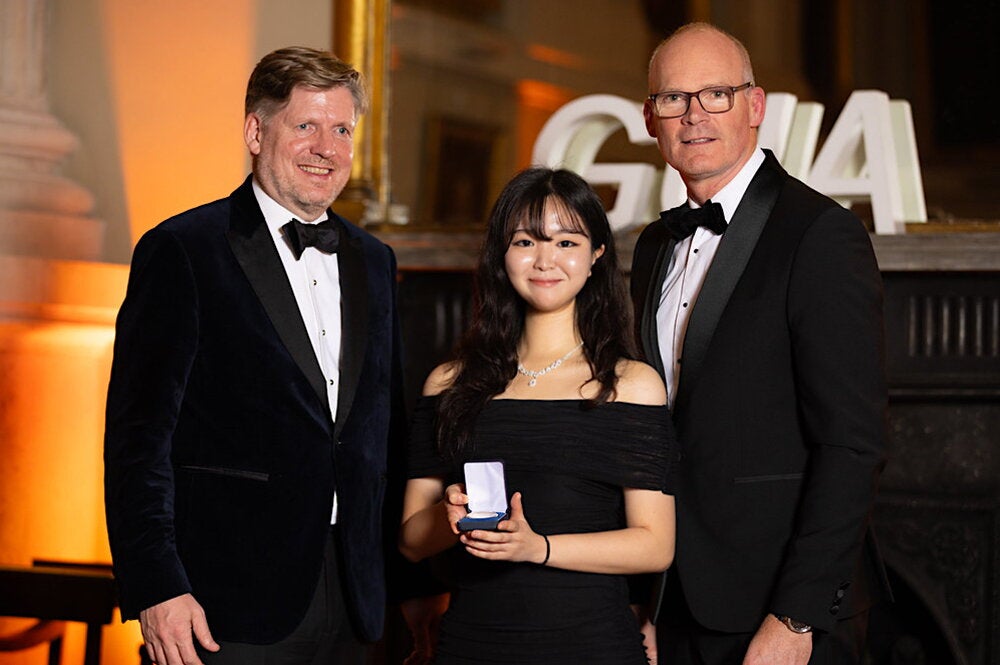

With the crisis raging in Ukraine, professors in the Department of Political Science recently met to publicly discuss some of the issues arising from the conflict. Why did Putin invade? Will Ukraine join the European Union? Will China become involved? How will this affect international relations—and what can be done to keep the war from spreading?
You can watch a full recording of the discussion here, courtesy of the Department of Political Science, which organized the event.
The roundtable was co-sponsored by the European Union Center and the Russian, East European & Eurasian Center. The recording can also be accessed through the event page.
Excerpts of the discussion, edited for space, are below.
The roots of the conflict
Speaker: Carol Leff
Let me just back up about 30 years, because the problem today is a problem that started when the Soviet Union fell apart… For Vladimir Putin, and to be fair, I'm going to try to tell you (that) his feelings are shared. This was a shattering experience for many Soviet citizens, especially for Russians… In particular the trigger was Ukraine. It was the younger brother, and Russia was the older brother. They shared a Slavic identity, they shared a religion, and it's not a coincidence that after Ukraine voted for independence (in 1991), within weeks, Russian leader Boris Yeltsin decided there's no point in the Soviet Union, if the two were separate. So it isn't just Putin who finds it hard to deal with the idea that Ukraine is a separate country.
The politics of words is important. Don't call it THE Ukraine. Ukraine translates as borderland, but if you say THE Ukraine, you're thinking of it as a borderland from the center of the old empire, from the center of the Soviet Union, that means borderland of Russia. THE Ukraine used to be a common word.
Will Ukraine join the European Union?
Speaker: Konstantinos Kourtikakis
The big question is, Will Ukraine join the (European Union)? ... Ukraine may join officially the EU one day, when it's ready. It's just that it will take a very long time to get there. The sense that I get from Brussels is that Ukraine’s application to join the EU is seen as having primarily symbolic value. It's a way for Ukraine to say, “Look, I belong with Europe, I have European values, and they don't belong to Russia.” And that's how it's understood, even though there are some countries that are arguing for putting Ukraine on a fast track. But I want to explain why that's not possible. One of the reasons has to do with the nature of the European Union… the EU is a type of a semi-federal system, and that means… you need to give up sovereignty, and share sovereignty. And that's not easy. You need to integrate legally, and politically, and that's not easy. So a country needs to think very, very well before it joins, because it gives up powers that it has. And it needs to do things the way the EU wants it to be done. Your country needs to be ready to do it…
I get the sense that Ukrainians want to prize their sovereignty and maybe they may want to keep it—assuming of course that Ukraine has not become a part of Russia as a result of that war. Other reasons why the EU is not willing to accept Ukraine as a member regardless of what happens with this war as that the EU is very reluctant to accept members for political reasons, and that’s what would happen in this case.
How does the war affect international relations?
Speaker: Nicholas Grossman
In terms of the reaction, this has already upended the international order… First, Finland, Sweden, and Switzerland have all been participating in the effort to punish Russia. Finland and Sweden in particular (have been) sending weapons. Finland and Sweden were neutral throughout the Cold War and Switzerland (was) famously neutral in even World War II. That’s effectively over. Putin managed to end Finnish, Swedish and Swiss neutrality. … Germany has announced that is going to be spending upwards of $100 billion on its military, Japan (has sent) some equipment and possibly increase its military. That means that German and Japanese disarmament, a legacy of World War II, is also ending.
Where this will get really ugly, potentially, for Europe is if Ukraine falls, there will probably be an insurgency. There is no record there's of a modern insurgency losing when it has safe harbor next door. So it can basically cross the border and hide there. Where this gets especially risky is that if those staging areas are cross border… that means places like Poland or say Moldova will be attractive places for insurgents to try to stage. If there's an insurgency staging from there, Russia will probably want to bomb it. Then we get into that big NATO question. So far mutually assured destruction seems to be working as well as it has in the past. But be careful not to underestimate the risk of things (such as) accidents and miscalculation. It's not a video game. Everybody's not calm.
What are the prospects of China helping Russia?
Speaker: Yujeong Yang
If China is perceived to be enabling Russia's aggression, then that could incentivize the Western countries to have tariffs or other curbs on trade with China… China cannot afford that. Chinese businesses and commercial banks (have distanced) themselves from Russia. Two of China's biggest commercial banks, the Bank of China, and the Industrial and Commercial Bank of China( ICBC) in recent days restricted financing of purchases of Russian commodities. Chinese large tech firms also have little to gain by pivoting to Russia… European and North American countries have far more to offer to China than what Russia companies can ever offer to China, especially when it comes to purchase of cutting edge equipment, semiconductors, software and high end industrial goods.
Of course some countries make an economically unattractive decision for political gain, but for China and especially for (China President) Xi Jinping this is not economically rewarding or politically attractive. The prime legitimacy of the (Chinese Communist Party) or Xi Jinping hinges largely on economic performance, so if it loses this lucrative market for siding with Russia, it is likely to bring political losses as well as economic losses. China’s capacity to grant tangible support to Russia is limited. However limited it is, China may still want to support Russia so that they can together they can conquer the Western hegemony. China is likely to find ways to help Russia mediate the impact of sanctions without blatantly violating the sanctions. China has done that before. China has the playbook that it used before to assist Iran and North Korea evading sanctions. So it might use that playbook for Russia case as well. But of course Iran is not Russia. North Korea is different than Russia… And this is an unprecedented level of sanctions.


